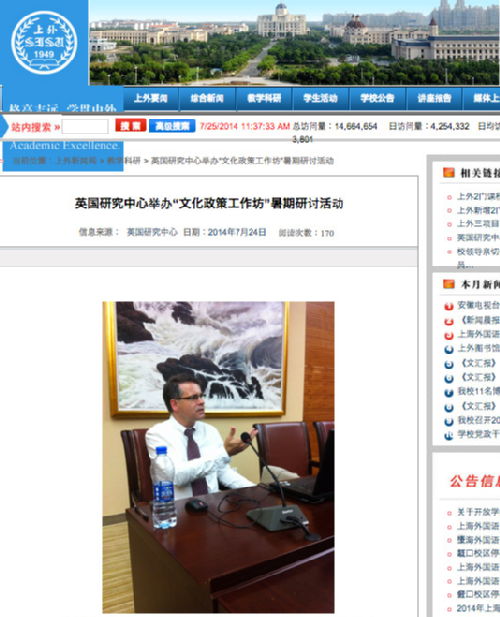All entries for Friday 25 July 2014
July 25, 2014
My visit to Shanghai International Studies University [SISU], 17th July 2014

This is a clip of a page of the SISU website. SISU is a small yet elite institution specifically charged by central Government for (among other things) international academic relations and comparative research on foreign countries. In the past it has supplied the Chinese government with civil and diplomatic service staff, along with many of its graduates who are sent to work in embassies and agencies around the world. I have visited SISU before – the last time organising a seminar with my generous host and counterpart Professor Jian Gao and Assistant Professor (and CAL Warwick graduate) Dr Zhou Xiaozhou. Our last seminar served to scope out some research collaboration – and in my talk I put to them a number of questions (speaking, I hasten to add, as a neophyte on China studies): how is culture changing in China, or ‘evolving’ alongside an enduring communist party system? How are each of the arts or literature developing – and according to what (aesthetics, style, audiences, ideas and subjects, etc.)? Does China have a ‘public sphere’, and what role does culture play in that? How are ideas or debates transmitted, and how do citizens participate in ongoing changes in Chinese cultural life? We also discussed the growing ‘cultural economy’ in China – where ‘economy’ is becoming a huge component of political rhetoric. In China it is curious how, given the enduring strength of the communist social system, how the Government seems to assume that capitalism and its consumer markets can be completely managed and tamed for the good of the People’s Republic.
I have been fascinated by the recent history of China – and the question of the fate and meaning of ‘culture’ in China. The Cultural Revolution (c.1965-76) devastated China’s intellectual culture as it did China’s cultural and religious heritage; post-Mao industrialization wiped out a considerable amount of rural, local and traditional craft-based industry; in the 1990s, rapid urbanization and the rise of the Chinese megacity virtually reconstructed the social order and the vernacular culture of everyday Chinese life; and now in the new millennium, Chinese markets are flooded with global brands, the internet is threatening political as well as cultural 'security', billions of yuan are being invested in the creative industries and heritage parks...consumer culture and economic globalization is presenting Chinese scholars with a dilemma: what does ‘culture’ signify in China? By implication, what is the object of cultural policy? It is this question SISU scholars and me are now exploring for a journal special issue. I will report more when tangible returns appear.
 Jonathan Vickery
Jonathan Vickery

 Please wait - comments are loading
Please wait - comments are loading

 Loading…
Loading…